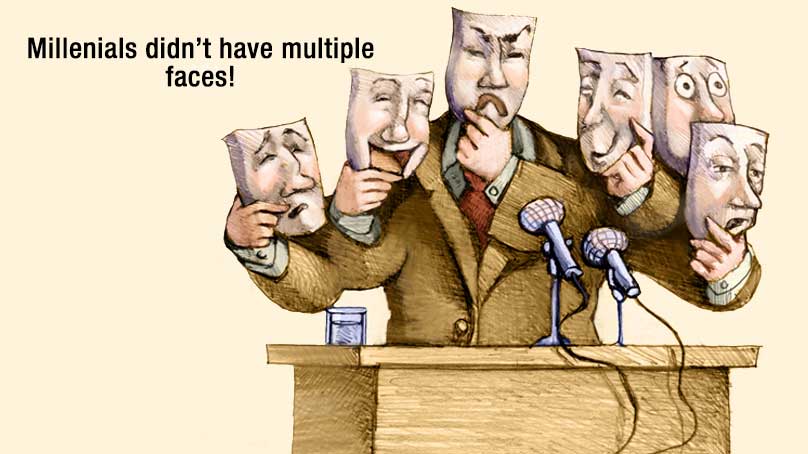
We want to be sell-outs, say millennials

Perspective
Meghna Maiti
There was a time when greatness of human beings was measured by their ability to create something brilliant with no hope for immediate material gain or prize. Recognition even when it came was far more in the form of legacy that influenced the world, socially or politically, for years to come. There was nothing transactional about it, no sense of give and take. When people had ideas they kept it to themselves in their amorphous form and ruminated over those for a long period of time. That would eventually get crystallised into their minds and give birth to a great piece of art or scientific discoveries or religious theories that attempted to change the world. Thinking about immediate monetary gain or profit through those very ideas was absolutely blasphemous. Such people never wanted to be a sell-out.
The concept of greatness has however changed in recent times. The millennials, born between 1980s to 2000s, too seek greatness but that of a more commercial kind. The philosophers within them still want to share their ideas with the world but at a price. Post liberalisation, in the times driven by a free-market economy they understand the fact that there cannot be any gain, in the form of recognition or whatsoever without a market. Also, globalisation has increasingly exposed the truth that the sense of ‘greatness’ too varies from culture to culture, society to society.
While a certain kind of writing might make someone a hero in a certain society, it might not be of any worth in another society. Hence, they realise the importance to develop a global world-view through a wider lens that includes people of all cultures, societies, caste, creed, and race. They also understand the reality that after-all everything, all sorts of institutions, corporates, banks, media are all inter-related. One cannot exist without the other and there is no ideal entity. This has given the millennials the courage to shed off all extra faces and stay with the most basic, pure one. They are now ready to sell out or commercialize their desires, their ideas. They are willing to shed off any veneer of false respectability or narrow individualism to reach at a collective truth that benefits a number of people.
Digitisation too has aided in erasing narrow differences based on class or background prejudices and usher in more egalitarianism. Coupled with that startup India has yet again brought in many examples of ‘selling out’ wherein enterprising individuals like Uber, Ola or Flipkart owners haven’t shied away from selling their ideas to start big enterprises that provided jobs to many people.
owners haven’t shied away from selling their ideas to start big enterprises that provided jobs to many people.
The entire move towards ‘selling out’ started predominantly in the late 90s when B-schools of India, led by Indian Institute of Managements were focusing more on studies that helped individuals start a business of their own to fix a certain problem in the society. This was of course inspired by Silicon Valley and the likes. As more and more bright scholars and cream de la cream of India in B-schools began the entire process of letting go off prestigious jobs at MNCs to set up their small businesses banking on their ideas, the mind-set of the young, aspiring Indians started changing. They slowly looked beyond individual glory towards a wider play-field that brought in both self and pelf.
Add to that, the incubation centers across IIMs, IITs, ISB and other institutes started turning into hubs for nurturing and commercialising unique ideas that could convert into viable businesses. Since the last seven years platforms like Ted and Ink talk too have been providing platforms to many bright individuals to test and share their ideas with the world.
Many wise, intelligent people of much older generation might still be frowning at the millennials and their willingness to sell themselves and their thoughts so readily. There goes some rare pieces of greatness down the drain!- the older ones must be thinking. But slowly and steadily perhaps they too would realise the fact that the ability to take risks, experiment and accepting the basic truth that life in the world cannot be lived without money and that light is just the other side of darkness, is itself revolutionary and liberating!





